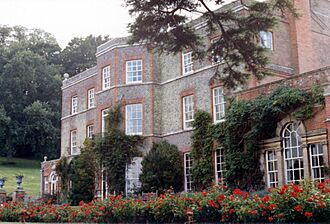Nunwell House facts for kids
Quick facts for kids Nunwell House |
|
|---|---|
 |
|
| General information | |
| Type | English country house |
| Country | England |
Nunwell House, also known as Nunwell Manor, is a very old and important country house in Brading, Isle of Wight, England. It's about 3 miles south of Ryde. This house shows off beautiful Tudor architecture and Jacobean architecture styles. It also has parts added later on.
The house is special because it has been home to the Oglander family for a very long time, since the Norman times. You can find many family military items inside. Nunwell House is recognized as a Grade II* listed building, meaning it's a historically important place. From the house, you can see great views of Brading harbour and St. Helens Road.
Contents
History of Nunwell House
Nunwell was once a manor owned by Earl Tostig before the Norman Conquest. After the Conquest, the king owned it. The Oglander family has been connected to Nunwell for centuries. It's believed they lived there since the early 1200s.
Early Owners and Changes
In the 13th century, members of the Oglander family, like Roger Oglander, were involved with land in Nunwell. By the end of that century, Henry Oglander held Nunwell. He passed away around 1310. His son, Robert, inherited the manor.
Later, Reginald Oglander held part of Nunwell. This part became known as West Nunwell. The manor continued to be passed down through the Oglander family.
The Oglander Family and Royal Connections
In 1483, John Oglander owned the manor. His grandson, George, held it in 1567. At this time, it was called West Nunwell. The old manor house was damaged by fire during the time of King Henry VI. It was once a large house with a village of 50 homes nearby.
Sir John Oglander was a famous Royalist. He was a deputy governor of Portsmouth and a deputy-lieutenant of the Isle of Wight. He welcomed King Charles I to Nunwell. This was the King's last night of freedom before he was captured. Sir John kept valuable notes about the local area. These notes are still kept at Nunwell today.
Sir John's son, William, became a baronet in 1665. A baronet is a special title given by the king. The manor stayed in the Oglander family for many generations. The last baronet, Sir Henry, passed away in 1874 without children. He left the estate to his cousin, John Henry Glynn. John Henry Glynn then changed his name to Oglander in 1895 to follow Sir Henry's wishes. He owned Nunwell in the early 1900s.
Nunwell House Grounds
Nunwell House sits on a raised area. It has a large, open lawn in front of it. Behind the house, there is a lovely group of ash and lime trees. The property also features a 5.5-acre garden. This garden includes a peaceful lily pond.
 | Leon Lynch |
 | Milton P. Webster |
 | Ferdinand Smith |

